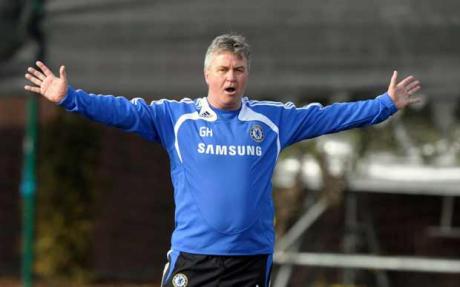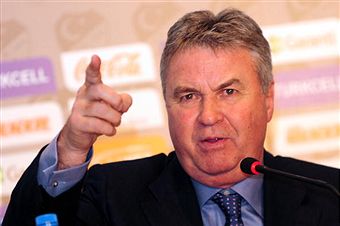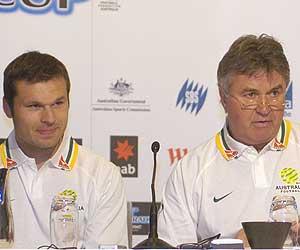“Why are we so enthusiastic about Barcelona and Lionel Messi?
“[It’s] because he is playing like a kid.
“It’s like he is leaving his house and saying to his mum, ‘I’m going to play football, I’ll be back at 9 o’clock.'”
Sitting on the banks of the Bosphorus talking football with Guus Hiddink, the vastly experienced new manager of the Turkish national team - well, let’s just say, I’ve had tougher assignments.
The 63-year-old Dutchman takes the reins formally in August, starting a new chapter in a career that has taken him from De Graafschap to Chelsea, Australia to Russia, yielding a European Cup, two World Cup semi-finals and six Dutch championships along the way.
Most unusually, he will be missing from this year’s World Cup finals in South Africa, after his Russian team surprisingly failed to qualify. But this only makes his observations about the tournament potentially all the more interesting.
In particular England fans, attuned to years of failure, will be heartened to learn that this football man, who took Chelsea to the FA Cup last year, thinks they have the ingredients to do well in South Africa.
“I’m very interested in how the England squad will do,” he says.
“They have a very experienced coach [Fabio Capello].
“He knows exactly how to approach the players individually, as a team and in a tournament.
“The players missed [Euro 2008], they are anxious to perform.
“If they are full of confidence - and they should be because of their quality and their personality - they must go all the way I think.”

Having swallowed his personal disappointment at his team’s failure to qualify, Hiddink (pictured) is now looking forward to watching the tournament on television: “If you are in, you just focus on your own team,” he says. “You don’t see the whole tournament. Now I can see it.
“Let’s hope that the teams who play attractive football advance to the semi-finals,” he goes on.
“If Spain can advance it would be nice.
“I hope Holland as well because they like to play football in a very attractive way.
“That’s what I hope as a football supporter now.”
As for South Korea, the team he managed to a remarkable fourth-place finish in the 2002 World Cup: “Once they have something in their mind, an aim, and they have the confidence…if they are well-trained, which they were in 2002, then they could sting like bees.
“If they maintain their rhythm and have the confidence to perform, they can be dangerous.”
 Hiddink does not expect this World Cup to be as affected by exhausted players as some tournaments in recent times.
Hiddink does not expect this World Cup to be as affected by exhausted players as some tournaments in recent times.
“It will be wintertime in South Africa, which means the temperatures will not be going into the 30s with a lot of humidity,” he says, though he adds that, in some cases, altitude might pose a problem.
He recalls that in Korea in 2002, the Korean team “knew that European teams might get to Korea a little bit exhausted”.
“We knew if we were physically top, top, top fit, we could maintain our tempo in the game and at the end they would slow down.
“We took advantage of that by having a strategy and training.”
After so long in the game, Hiddink is a fount of amusing stories.
Remembering his time with Australia, whom he coached at the 2006 World Cup, the Dutchman observes that it was “always nice to work with people you can be direct with”.
“You know with Aussies, you can challenge them very directly; you don’t have to think, ‘Can I do that? Is he insulted, yes or no?’
 “For instance, [striker] Mark Viduka (pictured with Hiddink) said to me, ‘Why are you doing this boss? We didn’t achieve anything in 27 years and now you are dealing with us.’
“For instance, [striker] Mark Viduka (pictured with Hiddink) said to me, ‘Why are you doing this boss? We didn’t achieve anything in 27 years and now you are dealing with us.’
“I said, ‘First, you lose two or three kilos and then we’ll talk.’
“He lost that in five or six weeks.”
In spite of the variety of milieux in which he has worked, Hiddink says his football philosophy had changed little over the years.
“I always like the teams who like to play with guts,” he says.
“Players who like to play football.
“Of course, you have to look for the right balance - I like to have also, within the rules, tough defensive players.
“But they must manage the ball, everyone has to manage the ball.”
The Dutchman - who worked briefly in Turkey once before, in 1990 with the leading Turkish club Fenerbahçe - says that the leaders of the Turkish Football Federation have made “a very serious impression on me”.
“This country is mad about football and always when there is passion I like it very much,” he says.
“But on top of that I think the management has become very serious in this country.
“I think [Turkey] has modernised a lot…
“I think it’s a very positive sign that, regardless of whether Turkey wins the right to host Euro 2016 [they are up against Italy and France in a contest whose outcome will be decided next month], they will go on with improving the infrastructure.
“I think that’s a proof of seriousness for football development not just for top-class football but also for the grass-roots.
“It means for me that the people in charge are very serious about the future.
“I think that’s the big change: not just thinking about today, but also tomorrow.”
Hiddink’s first major task will be ensuring that the Turkish team, which reached the semi-finals of Euro 2008 but will not be in South Africa, qualifies for Euro 2012 in Poland and Ukraine.
With his side bracketed with Germany in Group A, he is clearly not taking anything for granted.
“It’s a very tough qualifying group,” he says.
Quite apart from the Germans, he warns, “Don’t underestimate the renewal of the Belgian team.”
Coming from a Dutchman, that admonition sounds all the more ringing.
David Owen is a specialist sports journalist who worked for 20 years for the Financial Times in the United States, Canada, France and the UK. He ended his FT career as sports editor after the 2006 World Cup and is now freelancing, including covering last year’s Beijing Olympics. An archive of Owen’s material may be found by Twitter users at www.twitter.com/dodo938

.jpg)